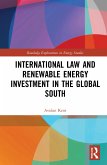This book applies concepts from ethics, justice, and political philosophy to five sets of contemporary energy problems cutting across time, economics, politics, geography, and technology. In doing so, the authors derive two key energy justice principles from modern theories of distributive justice, procedural justice, and cosmopolitan justice. The prohibitive principle states that "energy systems must be designed and constructed in such a way that they do not unduly interfere with the ability of people to acquire those basic goods to which they are justly entitled." The affirmative principle states that "if any of the basic goods to which people are justly entitled can only be secured by means of energy services, then in that case there is also a derivative entitlement to the energy services." In laying out and employing these principles, the book details a long list of current energy injustices ranging from human rights abuses and energy-related civil conflict to energy poverty and pervasive and growing negative externalities. The book illustrates the significance of energy justice by combining the most up-to-date data on global energy security and climate change, including case studies and examples from the electricity supply, transport, and heating and cooking sectors, with appraisals based on centuries of thought about the meaning of justice in social decisions.
Hinweis: Dieser Artikel kann nur an eine deutsche Lieferadresse ausgeliefert werden.
Hinweis: Dieser Artikel kann nur an eine deutsche Lieferadresse ausgeliefert werden.








